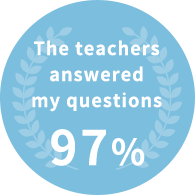Course Overview
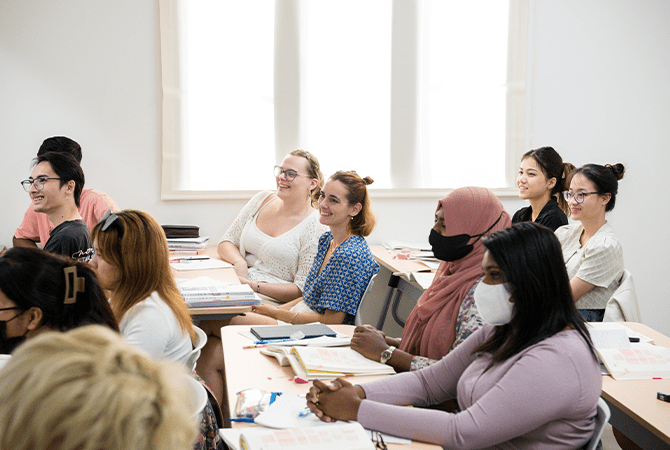
Kyoto Minsai’s Long Term Course provides students with the opportunity to learn Japanese systemically for one to two years. Apart from regular Japanese language classes, students also take Japanese Language Proficiency Test (JLPT) preparatory classes and choose specialized courses in preparation for their career paths after graduation. This course also has elective and extra classes offered at set schedules during school semesters.
Additionally, Kyoto Minsai provides our Long Term students with countless extracurricular activities while learning Japanese through schoolwide events such as speech contests & yearly barbeque parties and culture classes such as Japanese calligraphy & Japanese chess. We also have various school clubs such as the Minsai Sencha Club where members learn the art of Japanese tea ceremony and the Minsai Agriculture Club where members learn how to plant and grow crops in a small field near our campus. We also partner and organize various cultural exchange events with nearby universities, allowing our learners to interact with local Japanese students outside of our campuses.
Long Term students take classes in our Saiin, Tenjingawa, and Nishikyogoku campuses and are able to take on part-time work for up to 28 hours per week to supplement their living expenses in Kyoto.
Minsai Student Survey
| My Japanese skills have improved | 95% |
|---|---|
| The study environment is good | 98% |
| The staff at the office are friendly and helpful | 96% |
| Overall satisfaction (I would like to introduce this school to others) |
93% |
- From student survey conducted by the school
Course Details
Academic Course
This course is suitable for students going to higher education who want to focus on preparation for language tests (Japanese Language Proficiency Test/JLPT or the Examination for Japanese University Admission for International Students/EJU) and other general entrance exams. Students also receive support in choosing a desired course in a Japanese university, vocational school, or master’s degree.
- Levels
-
Beginner I / Beginner II / Pre-Intermediate / Intermediate I / Intermediate II / Advanced
READING WRITING LISTENING SPEAKING (Conversation) SPEAKING (Presentation) Beginner I Able to read about the events of the day and familiar topics. Able to read short, simple announcements and understand instructions. Able to write about oneself, one's country, and one's family with simple words and expressions using hiragana and katakana. Able to understand set expressions and instructions, such as conversations during shopping. Able to understand simple, short conversations between two people. Able to have simple conversations by listening to and answering questions about oneself and/or familiar topics. Able to make simple requests or invitations to others and respond to them. Able to describe oneself, one's family and friends, the place where one lives, and other situations using simple terms. Beginner II Able to read texts that are relevant to oneself. Able to accurately read announcements, instructions, and necessary information commonly encountered in daily life. Able to write about one's personal experiences, aspirations, and familiar topics using basic kanji commonly used in daily life. Able to understand information necessary for daily life, such as train station announcements and weather forecasts. Able to understand conversations about familiar topics. Able to carry out conversations and routine exchanges in everyday situations.Able to make suggestions, apologize, ask for permission from others, and respond to them. Able to describe one's own country and daily life, and be able to summarize one's feelings and opinions in a simple manner. Pre-Intermediate / Intermediate I Able to understand Japanese society, culture, ways of thinking, and familiar social themes. Able to read and understand a person's feelings, their relationships, and the messages they convey in text and writings. Able to write one's own opinion on familiar topics, using reasons, experiences, and specific examples. Able to write explanatory text objectively. Able to understand the standard language used even when going to a new place or meeting someone for the first time. Able to generally understand what is being said even if the conversation is one-sided. Able to communicate comfortably in situations far from everyday life, such as when traveling or meeting people for the first time.Able to discuss the causes and solutions of problems about familiar topics. Able to describe experiences, events, hopes and dreams in detail, as well as situations and state of things.Able to briefly express one's opinion on familiar topics in speeches, etc. Intermediate II Able to generally understand a wide range of content, including social conditions and current affairs, as well as in one's own field of expertise. Able to understand the content, information, intentions, and arguments that a writer wants to convey while considering the development of the story. Able to write persuasive and logical texts, such as reports, on current topics in society and in one's own field of expertise. Able to understand the content of lectures, speeches, presentations, etc. in places of higher education.Able to understand colloquial Japanese spoken by people of a various ages.Able to roughly understand the content of most television programs. Able to communicate fluently and naturally in Japanese appropriate to the situation on a wide range of topics.Able to participate in discussions on familiar topics and explain one's opinion using accurate grammar while acknowledging the opinions of others. Able to think objectively and from multiple perspectives about current social topics and things of interest to oneself, and be able to provide explanations and opinions on those topics. Advanced Able to understand detailed information on a variety of social, technical topics, as well as abstract topics.Able to read by substituting for oneself, making comparisons, and be able to feel the richness of the text. Able to write coherent text on current international topics in modern society and technical content, appropriately incorporating citations and summaries. Able to understand all the necessary information in technical presentations, responses, and political content.Able to easily understand all the content in TV and movies. Both publicly and privately able to use a wide range of vocabulary depending on the topic and can respond flexibly and appropriately while observing the other person's reactions. Able to develop clear and persuasive arguments on specialized and complex topics.Able to respond naturally to statements including questions from an audience.
- Admission Period
-
2 years course: April
1 year and 9 months course: July
1 year and 6 months course: October
1 year and 3 months course: January
- Application Period
-
2 Years Course (April Intake):
Aug. 1 – Oct. 30
1 Year & 9 months Course (July Intake):
Nov. 1 – Feb. 28
1 Year & 6 months Course (October Intake):
Mar. 1 – May 15
1 Year & 3 months Course (January Intake):
June 1 – Aug. 30
- Class Hours
-
Morning Class: 9:20-12:30
Afternoon Class: 14:00-17:10
(45 minutes x 4 classes with breaks in between)
Monday to FridayClasses will be determined according to the result of a level check test.
Integrated Studies Course
This course develops students’ language skills such as reading, listening, speaking, and writing in Japanese. Knowledge of Japanese culture will also be expanded through various culture classes like Tea Ceremony (茶道), Flower Arrangement (生け花), Calligraphy (書道), etc. Practical information regarding living in Japan, Japanese customs, business etiquette and other related topics will also be taught. It is suitable for those aiming to live and work in Japan.
- Levels
-
Beginner I / Beginner II / Pre-Intermediate / Intermediate I / Intermediate II / Advanced
READING WRITING LISTENING SPEAKING (Conversation) SPEAKING (Presentation) Beginner Able to read about the events of the day and familiar topics. Able to read short, simple announcements and understand instructions. Able to write about oneself, one's country, and one's family with simple words and expressions using hiragana and katakana. Able to understand set expressions and instructions, such as conversations during shopping.Able to understand simple, short conversations between two people. Able to have simple conversations by listening to and answering questions about oneself and/or familiar topics.Able to make simple requests or invitations to others and respond to them. Able to describe oneself, one's family and friends, the place where one lives, and other situations using simple terms. Beginner II Able to read texts that are relevant to oneself. Able to accurately read announcements, instructions, and necessary information commonly encountered in daily life. Able to write about one's personal experiences, aspirations, and familiar topics using basic kanji commonly used in daily life. Able to understand information necessary for daily life, such as train station announcements and weather forecasts.Able to understand conversations about familiar topics. Able to carry out conversations and routine exchanges in everyday situations.Able to make suggestions, apologize, ask for permission from others, and respond to them. Able to describe one's own country and daily life, and be able to summarize one's feelings and opinions in a simple manner. Pre-Intermediate / Intermediate I Able to understand Japanese society, culture, ways of thinking, and familiar social themes. When job hunting, be able to read basic job information (conditions, benefits, job content, etc.) from companies in your desired field. Able to write explanatory texts objectively on familiar topics.Able to write a basic resume, simple statement of purpose, and emails when job hunting. Able to understand standard language with clear pronunciation even when visiting a new place or meeting someone for the first time. Able to understand basic questions about oneself during job interviews. Able to communicate comfortably in situations far from everyday life, such as when traveling or meeting people for the first time.Able to politely answer basic questions about yourself during an interview. When job hunting, able to promote oneself through one's career history, one's strengths, weaknesses, and be able to state reasons why you want to work for a company. Intermediate II Able to generally understand a wide range of content, including social conditions and current affairs, as well as in one's own field of expertise. Able to understand the content, information, intentions, and arguments that a writer wants to convey while considering the development of the story. When job hunting, able to understand the contents of the company website one is applying to. Able to write persuasive and logical texts, such as reports, on current topics in society and in one's own field of expertise. When job hunting, able to write resumes that promote oneself, persuasive statements of purpose, and business emails. Able to listen to and generally understand Japanese spoken at job fairs and company visits, as well as content regarding visas and working conditions.Able to generally understand tasks and instructions given at a workplace.Able to generally understand the content of most television programs. Able to communicate fluently and naturally in Japanese appropriate to the situation, including over the phone, on a wide range of topics at Japanese companies.With an understanding of Japanese corporate culture and the idiosyncrasies of Japanese people, be able to explain one's own opinion in meetings etc. using accurate grammar while acknowledging the opinions of others. Able to think objectively and from multiple perspectives about current social topics and things of interest to oneself, and be able to provide explanations and opinions on those topics. Able to explain what one wants to do and what one can do at the company one is applying to. Advanced Able to understand detailed information on a variety of social, technical topics, as well as abstract topics. Able to understand texts with technical content required for writing proposals at a workplace. Able to write coherent text on current international topics in modern society and technical content, appropriately incorporating citations and summaries. Able to create reports and proposals needed at one's workplace. Able to listen to and understand all the necessary information in technical presentations, responses, and political content. Able to understand meetings, project explanations, etc. at a workplace. Able to easily understand all content in TV and movies. Able to use a wide range of vocabulary and honorific language accurately according to the topic, both at work and in private, and be able to respond flexibly and appropriately to situations while observing other people's reactions. Able to develop clear and persuasive arguments on specialized and complex topics. Able to give a presentation on a business plan that is fully understood by employees at one's workplace.
- Admission Period
-
2 years course:
January / April / July / October
- Application Period
-
April Intake: Aug. 1 – Oct. 30
July Intake: Nov. 1 – Feb. 28
October Intake: Mar. 1 – May 15
January Intake: June 1 – Aug. 30
- Class Hours
-
Morning Class: 9:20-12:30
Afternoon Class: 14:00-17:10
(45 minutes x 4 classes with breaks in between)
Monday to FridayClasses will be determined according to the result of a level check test.
Specialized Courses (Required)
Both Academic Course and Integrated Studies Course students who are in the intermediate level and above will select one from the following courses below and take them during the first and fourth period of Friday classes.
Advanced Academic Course
- Who It’s For
-
For students aiming to enter vocational school, university, or graduate school in Japan
Using various famous literary works and current affairs as reference material, students will improve their Japanese reading comprehension and conversation skills in preparation for entrance examinations.
Advanced Business Course
- Who It’s For
-
For students seeking to find employment in Japan with the “Engineer/Specialist in Humanities/International Services” and “Specified Skilled Worker” visa.
Students will learn business Japanese and business writing, practice proper job interview techniques, etc. in order to acquire skills needed when seeking employment in Japan.
Culture and Art Course
- Who It’s For
-
For students looking to further explore Japanese culture, history, and arts
Students will learn the art of Japanese tea ceremony, calligraphy, flower arrangement, kimono, etc. in order to deepen their understanding of Japanese culture.
Elective Classes (Optional)
At set schedules during semesters, students are offered these optional classes in preparation for university entrance examinations and the like.
- Subjects
-
English, Mathematics, etc.
Special Classes (Optional)
During long breaks in-between semesters, special classes are offered and students who wish to do so can participate to further improve their language skills.
- Class
-
Japanese Language Proficiency Test (JLPT) Preparation Class, Examination for Japanese University (EJU) Preparation Class, Basic Mathematics Class, Employment Preparation Class, Specified Skilled Worker (SSW) Test Preparation Class
Annual Events Calendar
At Kyoto Minsai, we organize and hold numerous events and activities all throughout a school calendar year for our students to not only enjoy learning Japanese but at the same time experience cultural exchanges with both local Japanese and people from diverse walks of life. Only in Kyoto can students experience the depth of Japanese culture and experience the charm of the old Japanese capital while studying the language.
-
April Entrance Ceremony for April Intake
Kanji Zumo(Spring) -
May School Field Trip to Temples & Shrines -
June Midterm Exams
School Field Trip to Disaster Prevention Center -
July Entrance Ceremony for July Intake
Gion Festival
Kanji Zumo (Summer) -
August Schoolwide Speech Contest -
September Final Exams
-
October Minsai Barbeque Party
Entrance Ceremony for October Intake
Kanji Zumo (Autumn) -
November Momiji Season -
December Midterm Exams
Mochi-making Event -
January Coming of Age Ceremony
Entrance Ceremony for January Intake
Kanji Zumo (Winter) -
February Final Exams
Biblio Battle -
March Graduation Ceremony
Application Requirements
Please select your preferred language and download our PDF regarding application requirements.
- 日本語版(Aグループ)
- 日本語版(Bグループ)
- English (Group A)
- English (Group B)
- 中文(繁体)
- 中文(簡体)
- Bahasa Indonesia
- русский
- Türk
- Tiếng việt
- ภาษาไทย
- Italiano
*About Group A and Group B
Since countries are classified as either Group A or Group B by the Immigration Services Agency, application requirements vary depending on the group.
Please refer to the link on the right to see which group your country is in. (Group Category Japanese / English).
To see which group your home country is in, please refer to the right section (Group categories Japanese / English).
General Flow of Admission
-
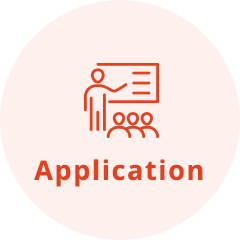
-
01: Admission Requirements
Applicant understands the admission requirements.
-
02: Online Interview
Kyoto Minsai conducts online interview with the applicant.
-
03: Documents Submission to Kyoto Minsai
Applicant pays an application screening fee of 33,000 yen before submitting the application documents to Kyoto Minsai.
-
-

-
01: Documents Submission to Immigration
After a thorough check, Kyoto Minsai submits documents to Japan Immigration Services Agency for the applicant’s Certificate of Eligibility (COE).
-
02: Issuance of COE
Screening of documents by Immigration Services Agency takes up to three months. COE will be issued to successful applications. In case of declined applications, “Notice of Not Granting Certificate of Eligibility” will be issued.
-
-

-
01: Sending of Invoice
Sending of COE (copy) and payment invoice to the applicant
-
02: Remittance of Fees
Completion of tuition fee payment before the deadline
-
03: Sending of COE
Confirmation of tuition payment and COE delivery (original copy) to the applicant.
-
-
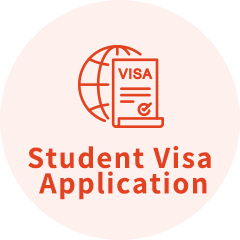
-
01: Applying For a Visa
Student visa application at the nearest overseas Japan embassy/consulate
*Certificate of Eligibility (COE) expires three months after issuance.
-
-
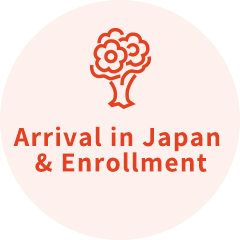
-
01: Arrival in Japan
Arrival in Japan. Various registrations and procedures.
Level placement test, entrance ceremony, school & daily life orientation at Kyoto Minsai.
-
-
Classes start!
Scholarships
Four kinds of scholarships are awarded to eligible students of Kyoto Minsai Japanese Language School.
Monbukagakusho Honors Scholarship for Privately-Financed International Students (JASSO)
-
Grant Duration
1 year
-
Stipend
30,000 Yen per month
-
Number of Recipients
1-2 students
-
Eligible Students
students enrolled for at least 6 months who aim for further education in Japan
Kyoto Minsai Japanese Language School Supporters Association Scholarship
-
Grant Duration
1 year
-
Stipend
20,000 Yen per month
-
Number of Recipients
1-2 students (number may increase in the future)
-
Eligible Students
students enrolled for at least 6 months
Kyoto Minsai Japanese Language School Scholarship
-
Grant Duration
6 months
-
Stipend
from 10,000 to 15,000 Yen per month
-
Number of Recipients
from 1-4 students
-
Eligible Students
students enrolled for at least 6 months
Kanda Sei Scholarship
-
Grant Duration
Three months tuition exemption
-
Stipend
150,000 Yen
-
Number of Recipients
1 student per school term (4 students per year)
-
Eligible Students
Second Year Students
- Students who receive scholarships bear no payback obligation.
- General Criteria
-
- 1. School attendance rate of at least 95%
- 2. Having shown excellent behavior in class and through turned in assignments
- 3. Excellent test and exam scores
Enrolled students do not apply for any of these scholarships as recipients of scholarships are carefully selected by Kyoto Minsai based on the students’ performance in class and other criteria, with each scholarship having its own provisions.



